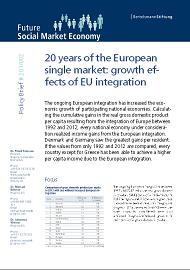Eichengreen, B. & Panizza, U. (2014) “Can large primary surpluses solve Europe’s debt problem?“, VoxEU Organisation, 30 Ιουλίου. For the debts of European countries to be sustainable, their governments will have to run large primary budget surpluses. But there are both political and economic reasons to question whether this is possible. The evidence presented in this column is not optimistic about Europe’s crisis countries. Whereas large primary surpluses for …Read More
The Meaning of a British Exit from the European Union
McCormick, J. (2014) “The Meaning of a British Exit from the European Union“, LSE EUROPP, 29 Ιουλίου. Since January 2013, and the announcement by British Prime Minister David Cameron of his plan to hold a referendum on continued UK membership of the European Union, there has been much speculation about the possible effects of a so-called ‘Brexit’. However, it can be no more than speculation, because no member state …Read More
Why is financial stability essential for key currencies in the international monetary system?
Goldberg, L., Krogstrup, S. & Rey, H. (2014) “Why is financial stability essential for key currencies in the international monetary system?“, VoxEU Organisation, 26 Ιουλίου. The dollar’s dominant role in international trade and finance has proved remarkably resilient. This column argues that financial stability – and the policy and institutional frameworks that underpin it – are important new determinants of currencies’ international roles. While old drivers still matter, progress …Read More
20 years of the European single market: growth effects of EU integration
Petersen, Τ. (2014) “20 years of the European single market: growth effects of EU integration“, Policy Brief 2014/02, Future Social Market Economy, Bertelsmann Stiftung, 29 Ιουλίου. The ongoing European integration has increased the economic growth of participating national economies. Calculating the cumulative gains in the real gross domestic product per capita resulting from the integration of Europe between 1992 and 2012, every national economy under consideration realized income gains …Read More
Why Institutions Matter in the Eurozone
Thillaye, R., Kouba, L. & Sachs, A. (2014) “Why Institutions Matter in the Eurozone“, Policy Network Publications, 17 Ιουλίου. Reforming EU Economic Governance The debate about the Eurozone’s future usually centres on a clash between economics and politics. Giving the EU greater oversight powers and more spending capacity is said to be the only viable long run solution, but there is little popular appetite for this option. As a …Read More
What’s in a European Commission President?
Salamone, A. (2014) “What’s in a European Commission President?“, Britain’s Europe Blog, 25 Ιουλίου. The next President of the European Commission faces a number of obstacles to a successful term of office. Political and institutional challenges, ranging from the power of the Council and the Parliament to the difficulty in building unity in the Commission, stand in the way of the President’s goals for the EU. In order to …Read More
Official discussions on Greece’s 5th program review to incept in mid-September: Key items on the agenda
Petropoulou, P. (2014) “Official discussions on Greece’s 5th program review to incept in mid-September: Key items on the agenda“, Eurobank – Greece Macro Monitor, 22 Ιουλίου. This report takes a close look on a number of quantitative targets and structural benchmarks included in the agenda of the 5th review of Greece’s adjustment program, expected to commence in mid-September. It also provides an overview of the progress already made by …Read More
Asset-backed securities: The key to unlocking Europe’s credit markets?
Altomonte, C. & Bussoli, P. (2014) “Asset-backed securities: The key to unlocking Europe’s credit markets?“, Bruegel Institute, 24 Ιουλίου. The European market for asset-backed securities (ABS) has all but closed for business since the start of the economic and financial crisis. ABS (see Box 1) were in fact the first financial assets hit at the onset of the crisis in 2008. The subprime mortgage meltdown caused a deterioration in …Read More
The Real Raw Material of Wealth
Hausmann, R. (2014) “The Real Raw Material of Wealth“, Project Syndicate, 26 Ιουλίου. Poor countries export raw materials such as cocoa, iron ore, and raw diamonds. Rich countries export – often to those same poor countries – more complex products such as chocolate, cars, and jewels. If poor countries want to get rich, they should stop exporting their resources in raw form and concentrate on adding value to them. …Read More
What Does the 1930s’ Experience Tell Us about the Future of the Eurozone?
Crafts, N. (2014) “What Does the 1930s’ Experience Tell Us about the Future of the Eurozone?“. JCMS: Journal of Common Market Studies, 52: 713–727, Ιούλιος. If the eurozone follows the precedent of the 1930s, it will not survive. The attractions of escaping from the gold standard then were massive and they point to a strategy of devalue and default for today’s crisis countries. A fully federal Europe with a banking …Read More





